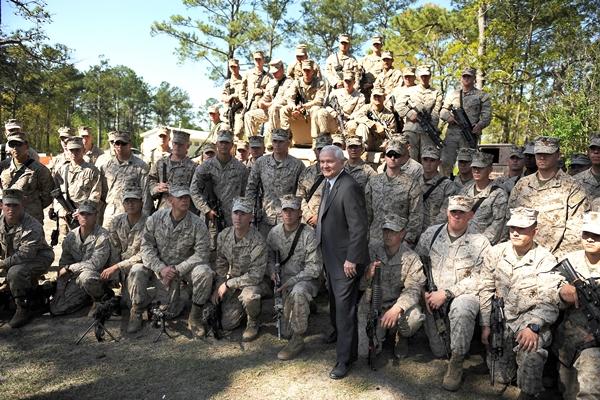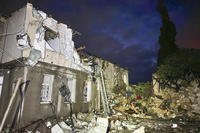Joseph "Danny" Zambito was 18 when he trained as a Marine in 1964 at Camp Lejeune, where he -- like one million others at the base -- was exposed to cancer-causing chemicals in one of the worst water contamination cases in US history, spanning more than three decades.
Zambito, now 70, lost both kidneys and his bladder to cancer, but the Florida man said he hasn't received a single disability benefit from the Department of Veterans Affairs -- whose anonymous panel of "subject matter experts" renders medical opinions on veterans' claims their diseases were caused by toxic drinking water at the North Carolina military training base.
"It makes me feel very angry," said Zambito, who undergoes dialysis four times a week at a center in Zephyrhills. "They're dragging their feet on this and giving me the runaround."
"You just want to give up," added his wife, Judy. "How can you fight the government?"
On Monday, the Veterans Legal Services Clinic at Yale Law School filed an extensive Freedom of Information Act (FOIA) request on behalf of three veterans groups seeking records from the VA about its program for investigating claims. Since the program's launch three years ago, the rate of Camp Lejeune toxic water disability claims being approved has dropped from approximately 25 percent to 8 percent, according to VA statistics. Advocates for veterans want to know who the purported experts passing judgment on the claims are, and how they arrive at their conclusions.
"There's been an enormous lack of transparency and it takes various forms," Rory Minnis, 33, a former Marine and second-year Yale law student, told FoxNews.com Thursday. "We want to know what qualifies them to give opinions on these extremely complicated cases. We want to know what the methodology is that they have in place."
Minnis and others fear the process is aimed more at limiting claims than giving sickened Marines their due, and perhaps more ominously, could be a blueprint for the military's handling of similar situations in the future.
"This extends far beyond the issue of Camp Lejeune," said Minnis, who served in Iraq and Afghanistan. "The VA has referred to it [the program] in closed door meetings as the model for the future for toxic exposure claims facing veterans."
Between 1953 and 1987, nearly 1 million veterans, their families and civilian employees at Camp Lejeune were exposed to drinking and bathing water contaminated with dry cleaning chemicals, degreasers and a host of other toxins. Many base residents developed illnesses -- including rare cancers -- and disabilities in the aftermath.
According to the Agency for Toxic Substances and Disease Registry, "past exposures from the 1950s through February 1985 to trichloroethylene (TCE), tetrachloroethylene (PCE), vinyl chloride, and other contaminants in the drinking water at the Camp Lejeune likely increased the risk of cancers (kidney, multiple myeloma, leukemias, and others), adverse birth outcomes, and other adverse health effects of residents (including infants and children), civilian workers, Marines and Naval personnel at Camp Lejeune."
Victims claim the US Marine Corps hid knowledge of the problem for years and did not warn people their health might be at risk.
Retired Master Sgt. Jerry Ensminger, founder of The Few, The Proud, The Forgotten -- one of the groups seeking information -- lived on the base with his family in 1975. Ensminger's young daughter, Janey, was diagnosed with leukemia at age 6 and died when she was 9. After learning about the water contamination in a local news report years after Janey's death, Ensminger said he made it his mission to press the government for accountability.
Zambito, now 70, was exposed to the contaminated water at Camp Lejeune. The former Marine later lost both kidneys and his bladder to cancer.
"We have denial decisions with the write-ups from these subject matter experts with citations directly taken from Wikipedia," Ensminger told FoxNews.com. "These so-called experts are going back and questioning the judgment of the veteran's own physician, without ever seeing the patient or their medical records."
"This program was not developed to assist veterans. This program was developed to deny veterans their benefits," said Ensminger, 63, of White Lake, N.C. "This cannot stand. It's an atrocity."
Mike Partain, a 47-year-old veteran advocate, said he was conceived and born on the base, and diagnosed 39 years later with breast cancer -- a rarity in men.
"Over the years, we put together just over 100 Marines or sons of Marines who have the unique commonality of male breast cancer and exposure to the toxic water on the base," Partain said.
The Department of Veterans Affairs said it established the Subject Matter Expert program in 2012 to "complete Camp Lejeune medical opinions based on scientific studies and to bring additional occupational exposure science into the claims review process."
"The selected SMEs are clinicians trained in occupational medicine, environmental medicine, and toxicology," Welinda West, a Veterans Affairs spokeswoman, FoxNews.com in an e-mail Wednesday. "Additional training is provided following their selection as an SME at the Regional office Louisville, Ky."
West described the clinicians as "highly experienced professionals" who have been "directly or indirectly involved with care and/or assessment of our veterans at VA Medical Centers."
"The SMEs do not have predetermined opinions on these cases and do not render ratings decisions on claimed conditions," she said.
Minnis, however, accused the VA of "hiding behind a smoke screen."
"The opinions they write technically go to the adjudicator," Minnis said. "It’s a procedural way to say they're not technically deciding on claims."
"There have been numerous requests for information," he said. "The VA could not provide a single claim they had sent to an SME for medical review and had subsequently been granted for benefits."
In 2012, President Obama signed the Janey Ensminger Act into law to provide medical care for former residents who may have been affected by the contamination. Two years later, the Centers for Disease Control and Prevention found that the toxic water at Camp Lejeune significantly increased the risk of multiple cancers.
The calls for transparency within the VA's Camp Lejeune Subject Matter Expert, or SME, program are growing. Sen. Richard Blumenthal, D-Conn., questioned the credentials and conclusions of the subject matter experts in a conference call with the press on Monday. Blumenthal said the information sought in the FOIA request, "is the lifeblood of credibility and legitimacy and it should be disclosed," according to the New Haven Register.
For the veterans and their families affected by the toxic contamination, the denial of claims with little explanation is "painful beyond measure."
"I served a quarter of a century in the Marine Corps," Ensminger said. "I instilled in them our motto, 'Semper Fidelis,'" Latin for "always faithful."
"When I first found out about this, I had all the faith and confidence in the world that the US Marine Corps would step up to the plate and make it right," he said. "That was in error. These people did everything in their power to lie and cover it up."





























